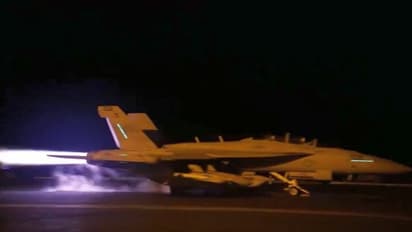US, UK target Iran-backed Houthi rebels, cite threat to Red Sea shipping route (WATCH)

Synopsis
The action was a response to alleged Houthi attacks on international maritime vessels in the Red Sea, including the use of anti-ship ballistic missiles. The strikes aimed to counter the threat to innocent lives, global trade, and freedom of navigation
The United States and the United Kingdom conducted a number of strikes on Houthi rebels in Yemen with support from Australia, Bahrain, Canada and the Netherlands on Friday in the wake of the alleged targeting of merchant vessels in the Red Sea by the Iran-backed rebels. In a statement, the White House said: 'These strikes are in direct response to unprecedented Houthi attacks against international maritime vessels in the Red Sea -- including the use of anti-ship ballistic missiles for the first time in history. These attacks have endangered U.S. personnel, civilian mariners, and our partners, jeopardized trade, and threatened freedom of navigation.'
UK’s Secretary of State for Defence Grant Shapps in a post on X said: "Four @RoyalAirForce Typhoons have conducted precision strikes on two Houthi military targets alongside US forces. The threat to innocent lives and global trade has become so great that this action was not only necessary, it was our duty to protect vessels & freedom of navigation."
Secretary Blinken called Jaishankar
It is pertinent to mention here that hours before the strike US’ Secretary of State Anthony Blinken telephoned his Indian counterpart S Jaishankar and discussed Houthi attacks in the southern Red Sea and Gulf of Aden, which threaten the free flow of commerce, endanger innocent mariners, and violate international law.
The US Department of State in a statement said: "The Secretary emphasized the Red Sea is a major commercial corridor that facilitates international trade and welcomed increased cooperation with India in defending freedom of navigation in the region."
Saudi Arabia, a key ally of the United States, said it is following with great concern the military operations taking place in the Red Sea region and the air strikes on a number of sites in the Republic of Yemen.
Australian EAM speaks to Jaishankar
"The first conversation of 2024 with @SenatorWong of Australia. Exchanged views on the state of the world and discussed our cooperation for this year, including through Quad," Jaishankar said in an X post.
What has happened so far?
Over 50 countries have been affected by attacks on commercial vehicles. Two days back, Indian Navy chief Admiral R Hari Kumar had said over 35 drone attacks on merchant vessels have taken place in the Red Sea, Northern and Central Arabian Sea in the last 40-42 days.
Over 2,000 ships have been forced to divert thousands of miles to avoid the Red Sea -- which can cause weeks of delays in product shipping times. On January 9, Houthi rebels targeted American ships.
In a stern message to the rebels, US President Joe Biden said: "Today’s defensive action follows this extensive diplomatic campaign and Houthi rebels’ escalating attacks against commercial vessels. These targeted strikes are a clear message that the United States and our partners will not tolerate attacks on our personnel or allow hostile actors to imperil freedom of navigation in one of the world’s most critical commercial routes."
"I will not hesitate to direct further measures to protect our people and the free flow of international commerce as necessary," he added.
Check the Breaking News Today and Latest News from across India and around the world. Stay updated with the latest World News and global developments from politics to economy and current affairs. Get in-depth coverage of China News, Europe News, Pakistan News, and South Asia News, along with top headlines from the UK and US. Follow expert analysis, international trends, and breaking updates from around the globe. Download the Asianet News Official App from the Android Play Store and iPhone App Store for accurate and timely news updates anytime, anywhere.